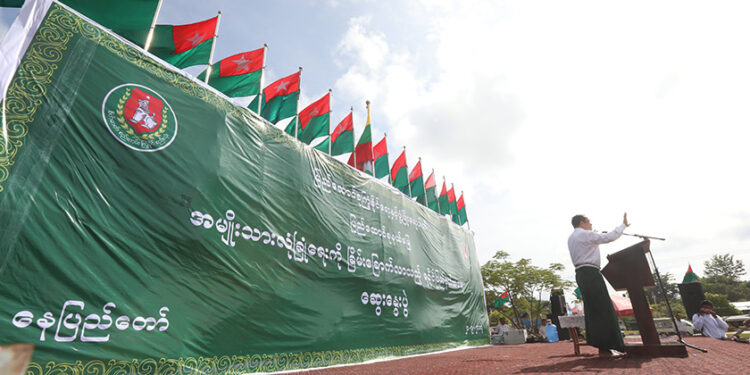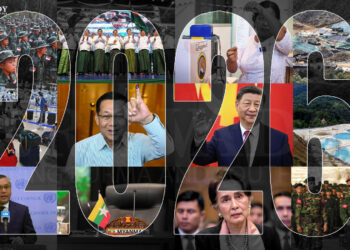YANGON—When Myanmar’s Union Parliament opened its debate on constitutional amendment this week, lawmakers from the military and their allied Union Solidarity and Development Party (USDP) proved to be men and women of principle. They stood firmly on a long-held belief: that (among other qualifications) Myanmar’s presidency should be reserved for a citizen whose spouse and other immediate family members do not hold citizenship in a foreign country. The stipulation lies at the heart of Article 59(f) of Myanmar’s Constitution, which was drafted by the former military regime.
In the eyes of many people—both at home and abroad—the article is a deliberate, personal ban aimed specifically at preventing Myanmar’s popular de facto leader Daw Aung San Suu Kyi from becoming the country’s president. Daw Aung San Suu Kyi’s late husband was British and her children are foreign citizens. Article 59(f) is among 142 clauses of the charter that her ruling National League for Democracy and some ethnic parties are now trying to scrap or amend in Parliament.
In defense of Article 59(f), the military and USDP camps have put forward some striking arguments. They painstakingly dusted off their history books and combed through them to unearth the following statement by Daw Aung San Suu Kyi’s father—independence hero General Aung San—in support of their position: “Anyone either loyal or subordinate to foreign governments or [who] gains interests from them shall not be an MP, not to mention the president.”
But one lawmaker from the former ruling USDP went even further this week, relating the situation to the US presidency. Her argument would be impressive—if only she had focused and gotten her facts right!
During her charter amendment comments in the Union Parliament on Wednesday, Daw Nang Ni Ni Aye said she opposed scrapping the article because “The president shouldn’t be influenced by a foreign country,” and “The family of the president has to be loyal to the country and citizens.”
OK—so far, so good.
“Other countries also have restrictions on [who is qualified to be] the president,” she added reasonably.
At this point, however, the lawmaker dealt her argument a fatal blow, presenting a power point slide to the Parliament, which she introduced by saying, “If you look at the US, you will see as stated in the power point.”
A slide appeared with the statement: “The President of the United States (including the vice president) has to be a Christian. Furthermore, no Yahudi (Jewish), Buddhist, Muslim, Sikh, Hindu—anyone not Christian shall not be employed at the White House.”
None of which, it turns out, is true.
The reason for her sudden inclusion of religion in the qualifications of the US president is not clear. But it quickly became the joke of the day and was widely ridiculed on Myanmar’s most popular social media platform, Facebook—strongly enough, in fact, that the US Embassy in Yangon felt compelled to explain the reality of the situation.
On the evening of the same day, the embassy posted—without giving a reason—a notice on its official Facebook page reading, “Did you know that to become President of the United States of America, there is no religious requirement?”
The bilingual (Myanmar and English) post states that candidates for the upcoming US presidential election represent the religious diversity of the country, as there are candidates who have not spoken publicly about their religion, alongside individuals who identify as Roman Catholic, Protestant, Hindu and Jewish.
“US law states that it is illegal for any employer—including the US government—to refuse employment to people based on race, color, national origin, sex, or religion. The US Constitution enshrines religious freedom in the First Amendment, which states Congress shall make no law respecting the establishment of religion, or prohibiting the free exercise thereof,” the post says.
You may also like these stories:
Myanmar Parliament Speaker to MPs: Act Civil or Face Lawsuits
Myanmar’s Military and USDP Reject NLD Attempts to Limit the Armed Forces’ Political Powers
Myanmar Military Chief Places ‘ Hti ’ at Bagan Temple Known for Divine Blessings

















